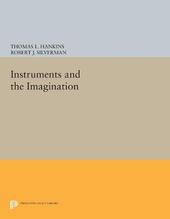
|
Instruments and the Imagination
Paperback / softback
Main Details
Description
Thomas Hankins and Robert Silverman investigate an array of instruments from the seventeenth through the nineteenth century that seem at first to be marginal to science--magnetic clocks that were said to operate by the movements of sunflower seeds, magic lanterns, ocular harpsichords (machines that played different colored lights in harmonious mixt
Reviews"[A] surprising and instructive book... A salutary perspective on a tale that is usually told very differently."--A. C. Grayling, Financial Times "Hankins and Silverman illuminate not only the tools of science, but the changing character of the enterprise itself."--Stephen Johnston, New Scientist "This imaginative and intellectually stimulating book reminds us that artifacts have an intellectual context, as well as a social one, and that a thick vein of the irrational runs through all of technology."--George Basalla, Technology and Culture "Thomas Hankins and Robert Silverman provide a welcome contribution... Their avowed intention ... [is] to look at instruments on the margins ... to show the significance of such instruments to the history of science. By making instruments a starting point for historical inquiry, [they] illuminate not only the tools of science, but the changing character of the enterprise itself."--Stephen Johnston, New Scientist
|